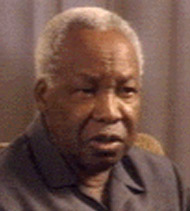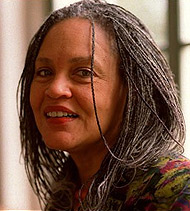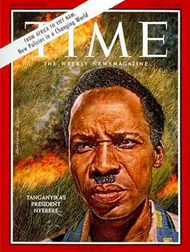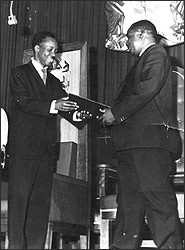Resources
Speech by the late Mwalimu Julius Kambarage Nyerere to parliament members of the South Africa
Madam Speaker and, I think I may say, Comrade President and Comrade Vice President, ladies and gentlemen. I have told you already how I felt when you asked me to come and talk here. And then I got the message that you were coming. Of course, I am happy you are here, but what do I say in your presence in this House? This is not my first time here. I have been here before and I have thanked you, but I must thank you again. For me to come here to this Chamber and address you is a dream which you have helped me to make true. How could any one of us have thought that it would be possible for me or people of my type to come to this country and speak from a forum like this? So, Mr. President, and all your colleagues, I say thank you very much for making this possible.
J.K.Nyerere, Cape Town 16th October 1997 - Mwalimu Julius K. Nyerere:-
Now, as for sharing my thoughts with you: my thoughts, unfortunately, don't change, so a lot of what I am going to say some of you will have heard before, but some of you have not. I am going to say two things about Africa. One, that Africa south of the Sahara is an isolated region of the world. That's the first thing I want to say. The second thing I want to say is that Africa south of the Sahara is not what it is believed to be because Africa is now changing. So let me see if I can share those thoughts with you in a very short period.
Africa south of the Sahara is an isolated region of the world. During the…
J.K.Nyerere talks with Charlayne Hunter-Gault


Published in December of 1996, is the talk that journalist Charlayne Hunter-Gault had with former Tanzanian President Julius K. Nyerere about seeking an end to ethnic conflict in the Great Lakes Region of Africa.
ELIZABETH FARNSWORTH: Next, Charlayne Hunter-Gault concludes her series on the origin of the crises in Central Africa. She talks with Julius Nyerere, a key figure in efforts to bring peace to the region.
CHARLAYNE HUNTER-GAULT: Julius K. Nyerere, the 74-year-old former president of Tanzania and one of Africa's most respected elder statesmen, led his country to an independence in 1961 and presided over it until 1985. Searching for a development path for his dirt-poor country, he introduced a governing concept that was meant to meld socialism with traditional tribal government. He called it "Ujamaa," Swahili for familyhood.
Through benign one-party rule and emphasizing racial and tribal harmony and moralistic self-sacrifice, Nyerere unified Tanzania from a far flung collection of tribes into a nation. But the country faltered. After Nyerere stepped down from power in 1985, the country was in shambles, and the socialist experiment was viewed as a failure. Nyerere resigned voluntarily after serving four terms. He handed over power to a constitutionally chosen successor, one of the few peaceful transitions in a region dominated by military governments and coup d'etats.
Rwanda and Burundi.
Neighboring…
Julius Kambarage Nyerere : How Much War?

This is a transcript obtained from the Time magazine. Read through the mind of Mwalimu about liberating Zimbabwe then and the then East African Community.
This was published on Monday, Mar. 14, 1977
What would happen if South Africa intervened militarily to prop up the white minority regime of Prime Minister Ian Smith in Rhodesia? Tanzanian President Julius Nyerere's answer: the five "frontline" African states that support Rhodesia's black nationalist guerrillas might well invite Soviet or Chinese intervention.
For Nyerere, 55, who led his country to independence 16 years ago, the simmering guerrilla war in Rhodesia overshadows matters much closer to home. Besides the problem of his socialist nation's faltering economy, he is confronted with the collapse of the East African Community that bound Tanzania with neighboring Kenya and Uganda in economic union, and the open hostility of Ugandan Dictator Idi Amin Dada, who accuses him of plotting an "invasion" in cahoots with former Ugandan President Milton Obote. Nonetheless, the future of southern Africa remains Nyerere's main concern, as he made clear in an hour-long interview with TIME Correspondent Lee Griggs last week at his two-story villa in Dar es Salaam:
Q. Will the insurgency in Rhodesia develop into full-scale war?
A. It is no longer a question of whether there will be war but of how much war. How much armed pressure is necessary…
Nyerere and the Catholic Church
Julius Kambarage Nyerere 1922 to 1999 Roman Catholic Church Tanzania
Julius Kambarage Burito Nyerere was born in 1922 at Butiama village, Musoma, Tanzania. He was a Zanaki by tribe. His father was Chief Burito Nyerere and his mother was Mgaya Wanyang'ombe. His father died while Kambarage was still young. His mother who raised him died in 1997 at the ripe old age of almost 100. Kambarage, the name he was given at birth, means "the spirit which gives rain" in Zanaki because the day he was born a very heavy rain fell.
In 1934 he was admitted to Mwetenge Primary School in Musoma, Tanzania, a school that was about forty-two kilometers from his home. Nyerere was a brilliant and hard working student. He regularly scored the highest marks in the class and was the leading pupil in all examinations. He received the highest score in the country on the standard four examination. After that he undertook studies at Tabora Government School in 1937, graduating in 1942.
When he reached the age of twenty, he decided to join the Roman Catholic Church. For the occasion he was asked to take a baptismal name so he chose the name Julius. He was baptized on December 23, 1943 by Father Mathias Koenen.
After passing the examination at Tabora quite successfully, he was able to begin studies at Makerere University in 1945. At the university, Nyerere liked to talk about politics, especially the politics of liberation. He also preferred traditional African dances to western…
Philosophy of Mwalimu Julius Kambarage Nyerere
"There must be equality because only on this basis will men work cooperatively. There must be freedom because every individual is not served by the society unless it is his. And there must be unity, because only when the society is united can its members live and work in peace, security and well-being.
Society must have institutions which safeguard and promote both unity and freedom and it must be permeated by an attitude—a society ethic—which ensures that these institutions remain true to their purpose, and are adapted as need arises."
- Mwalimu Julius K. Nyerere
With a humble bearing and an incisive mind, Julius Nyerere was the conscience of post-colonial Africa and its strategic leader. Facing the enormous challenges of political and economic development in a rapidly growing but unlettered population, Nyerere sought to build a new nation based on the best principles of European and African thought. Just as it did for the American revolutionary generation, independence represented a unique point in history, and the opportunity to build a new vision for society, “a more perfect union†for Africa.
Drawing on a wide variety of both European and African theories of state and social development, Nyerere developed a unique governing philosophy known as 'ujamaa' meaning 'familyhood' that has helped guide Tanzania on a path of peace and stability, and provided…
This is what Nyerere, Karume agreed on Tanzania

On April 26, 1964, The Father of Nation Mwalimu Julius Nyerere and the First Zanzibar's President Abeid Arnan Karume united Tanganyika and Zanzibar to form the United Republic of Tanzania. The Union was supported by what came to be known as the Articles of Union. Here is the original document of the articles as agreed by the founders of the two nations.
WHEREAS the Governments of the Republic of Tanganyika and of the Peoples' Republic of Zanzibar being mindful of the long association of the peoples of these lands and of their ties of kinship and amity, and being desirous of furthering that association and strengthening of these ties and of furthering the unity of African peoples have met and considered the union of the Republic of Tanganyika with the Peoples Republic of Zanzibar:
AND WHEREAS the Governments of the Republic of Tanganyika and of the Peoples' Republic of Zanzibar are desirous that the two Republics shall be united in one Sovereign Republic in accordance with the Articles hereinafter contained:-
It is therefore AGREED between the Governments of the Republic of Tanganyika and of the Peoples' Republic of Zanzibar as follows: -
(i) The Republic of Tanganyika and the Peoples' Republic of Zanzibar shall be united in one Sovereign Republic.
(ii) During the period from the commencement of the union until the Constituent Assembly provided for in Article (vii) shall have met and adopted a Constitution for the united…
